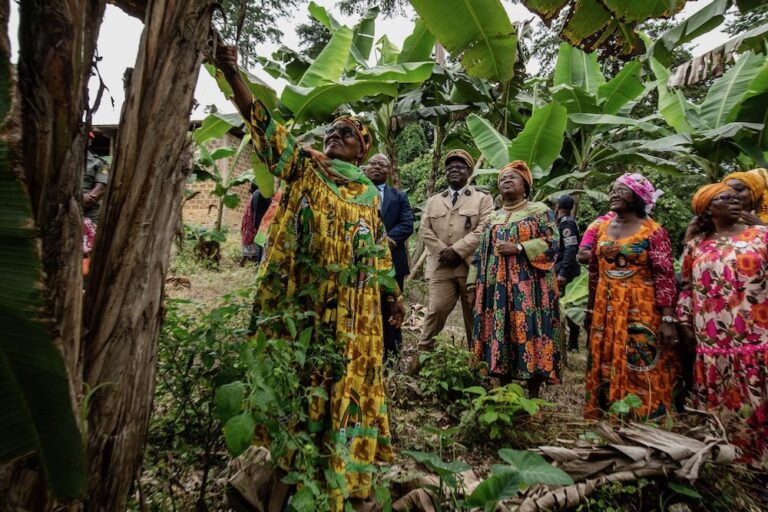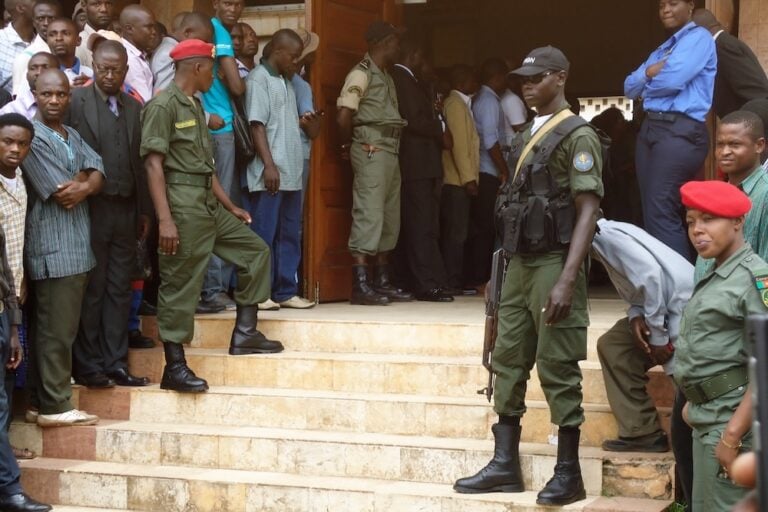(IFJ/IFEX) – The following is a 5 June 2008 IFJ media release: IFJ Calls on Cameroonian Government to End Intimidation of Journalists Reporting on Corruption Scandals The International Federation of Journalists (IFJ) today urged the Cameroonian government to end the intimidation of journalists reporting on corruption scandals in the country after at least five journalists […]
(IFJ/IFEX) – The following is a 5 June 2008 IFJ media release:
IFJ Calls on Cameroonian Government to End Intimidation of Journalists Reporting on Corruption Scandals
The International Federation of Journalists (IFJ) today urged the Cameroonian government to end the intimidation of journalists reporting on corruption scandals in the country after at least five journalists and media industry leaders have been interrogated by police in connection with the publication of articles on a defective aircraft bought for President Paul Biya.
“Police harassment of our colleagues is unacceptable and reflects a government campaign to intimidate journalists who cover corruption scandals,” said Gabriel Baglo, Director of the IFJ Africa Office. “We call on the government to stop using these tactics immediately.”
This is at least the third case in recent months of police interrogating journalists after they reported on government issues.
Five journalists and media leaders have been interrogated by the police on the President’s defective aircraft. Two other people have been summoned by the police today.
Marie Noëlle Guichi and Jean-François Channon of Le Messager newspaper received summonses from the judicial police on May 27 and reported to police on June 3. They were interrogated about a story published on May 26 that the two authored which dealt with the scandal of a presidential aircraft named “The Albatross,” which was purchased by aides to the President and is in bad technical condition. The plane almost crashed when President Biya took his first trip on the aircraft with his family.
According to Le Messager, the journalists are accused of publishing “the report of a judicial investigation not yet judged.” Channon and Guichi say they are in fact publishing the results of their own journalistic investigation. Both journalists have been indicted and face jail terms of three months to two years.
The Cameroon Journalists’ Trade Union (CJTU) has denounced these arrests that took place “in violation of legal provisions according to which the editor is the first (person) responsible to face any complaint.”
Thierry Ngogang, editor-in-chief of STV television station, discussed “The Albatross” case on his talk show on Sunday. Ngogang and his guests have been summoned by the police. The host and Anania Rabier Bindzi, Director of the International Cooperation of Canal 2 television station, and freelance journalist Alex Gustave Azebazé have already been questioned by police. Two other guests, Jean Marc Soboth, Secretary General of the Cameroon Journalists’ Trade Union (CJTU), and university lecturer Aboya Endong Manassé are expected to appear today or tomorrow at the police station for questioning.
In an unrelated case, Sévère Kamen, correspondent of Le Messager in the South of the country, spent a night in police custody after the publication of an article about a controversial sale of military equipment involving the son of a General of the Army.
Separately, Benjamin Fouda Effa, director of Radio Tiemeni Siantou, was reportedly dismissed in early May after pressure from the Minister of Communication in response to a program Effa presented that criticised the government closure of one television and two radio stations.
The IFJ and the CJTU called for Effa to be reinstated in his job and urged the government to reopen the two radio and the television stations and return the broadcasters’ equipment. The stations, Equinoxe TV, Radio Equinoxe and Magic Fm, were closed in February officially for not fulfilling all the administrative requirements for broadcasters but local sources have said the government used the requirements as an excuse to shut down the stations because they were critical of the government.
The IFJ represents over 600,000 journalists in 120 countries.


